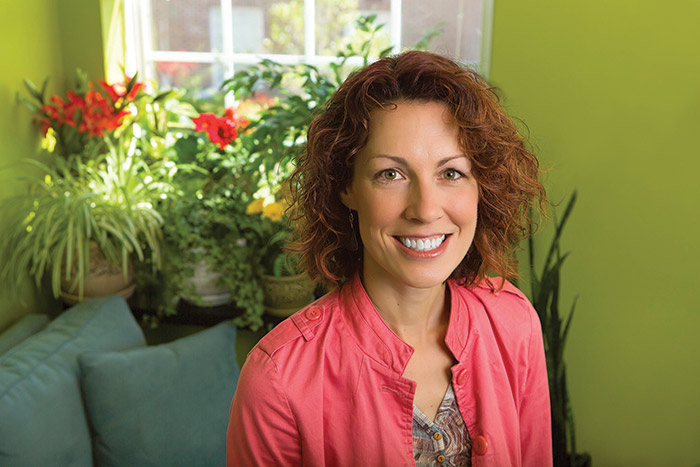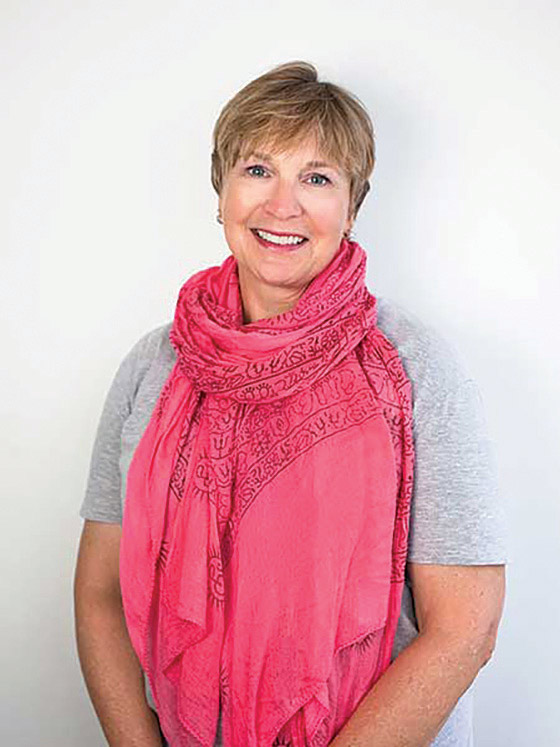Change may be part of life, but it’s never easy.
Keep calm and carry on, the expression goes, but how exactly are you supposed to do that? Emotions can get in the way of rational decisions. Negative thoughts can undermine your confidence. Worry can lead to sleepless nights.
“Change is the most scary thing in the world for everybody. Even good, positive change is scary because it’s different,” said Debbie Ash, a Morrisville financial advisor.
She and others who guide people through transitions offer some practical advice to make bouncing back, whether in relationships, finances or work, a little easier.

As prepared as she was for her transition, Debbie Ash had moments of doubt. But she didn’t let that keep her from moving forward. “One day about six weeks after I’d been here, I woke up and I had a panic attack,” she says. “And then I got over it.” Photo by Jonathan Fredin
Plan ahead. Talk to others involved, even if the conversations are short. Ask “what if,” and arm yourself with information.
Stay healthy. Your physical well-being affects your coping skills, so sleep, exercise and eat your vegetables.
Enjoy the process. Building your own business, a family change, or relocating might seem overwhelming, but learning how to live in a new way can be enlightening.
Seek a confidante. Find someone you trust, but who doesn’t have an emotional attachment to the outcome of the situation.
Adjust your point of view. Even if something beyond your control forced the change, you can still control how you will react and how you can create your future.
Give yourself time. You may have a day when you feel lousy or scared; that’s OK. Let yourself process the change.
Get help, if you can’t move forward. Find a support group, a therapist or a coach.
Breathe. Life is full of ups and downs. You are stronger than you think, and you’ll get through.
Debbie Ash
Ashbridge Financial Solutions
Ash knows a thing or two about major life changes.
A little more than two years ago, after her father passed away, she packed everything she owned into an 18-foot U-Haul, and left her home in Emporia, Kan., intent on building a new life.
“I felt like there was so much more out there. I wanted to go find myself, go explore the world, go see what else was out there,” she said.
“I had no job, no husband, no kids, no pets — it was just me on this new adventure, this next chapter of my life.”
The planning started well before Ash left Kansas. She focused on what she wanted in a new home — someplace close to the Midwest, but not too close, and definitely someplace warm. She found Raleigh-Durham and never looked back.
“I picked it based off of emotion. I came out here and investigated it and fell in love with it. I said, ‘this is where I want to go.’ This was the only place I even considered.”
An active member of the Emporia Chamber of Commerce, she asked for letters of introduction to the president of the Raleigh and the Durham chambers. She Googled, “Where do singles go in Raleigh? Where do singles go in Durham?”
This groundwork enabled her to start meeting people as soon as she hit town.
“I just started networking,” Ash said. “I went to the places they suggested and met people, who then introduced me to other people. It just kept going and going.”
It took about six months, but Ash found a job she loves, helping other people with their own life transitions.
Her most important piece of advice is one she followed: If possible, do some planning before the change happens.
“We don’t plan for a divorce; we don’t plan for our parents moving in with us. But if you can, sit down with somebody and have those conversations. Think about the ‘what ifs,’ and DO some planning just in case,” Ash said. “Then if something does happen, it won’t be quite as scary.”
Build your support system when everything is calm, she says, and find someone you trust to give you financial or other advice that is tailored to you.
“Have a conversation about the pros and cons of the decision you’re trying to make, because everyone’s situation is different,” she said.
“You don’t want to run out and make a rash decision that could affect your future. You’ve got to take a little time.”
Time to think and consider is crucial. Ash did a lot of journaling when she first moved to the Triangle, just to process all the emotion and information she was taking in. Taking walks outside, being quiet with nature, can help clear the mind. Others need a sympathetic ear to help them sort through things.
And finally, realize that there’s no right way to get through a crisis. Ultimately, the journey is your own.

Kristen C. Wynns says it’s important to get enough sleep, eat right, exercise regularly and engage in some type of relaxation or mindfulness practice. Keeping yourself healthy is a good way to prepare for unexpected events. Photo by Jonathan Fredin.

Keanna Jones; contributed photo.
“You really need your band of brothers or your band of sisters. Just whomever you can trust to be there for you. … I asked a client, ‘If you were going to ask someone to come take care of you when you had the flu, who would you call? Who would come if you called?’”
KEANNA JONES,
Director of mental health services at CORRAL and a licensed professional counselor
Kristen C. Wynns
Founder of Wynns Family Psychology
Although a crisis can hit unexpectedly, paying attention to your physical and spiritual needs can help you become more resilient, says psychologist Kristen Wynns.
“If you have been getting enough sleep, exercising, engaging in relaxation or mindfulness activities — massages, meditation or prayer — and eating well, you will be much better accustomed to handling stress physically and mentally,” she said.
Changing relationships, with a friend, child, spouse or parent, often lead to that stress, but Wynns cautions that this ebb and flow is normal.
“Sometimes relationships are in a period of growth and connection, and other times, the relationship may feel distant or even acrimonious,” said Wynns. “There is no such thing as a ‘perfect’ relationship.”
At these moments, it’s important to take care of yourself, seek help from a confidante or your support system, and keep lines of communication open with the other person.
And it may not be new advice, but looking on the bright side can also help. The way we think about a situation is directly related to how we feel, Wynns says, so she encourages her clients to replace negative thoughts with more realistic or positive ones.

Kelly Walsh says to keep moving forward, even if you don’t think you are getting far. “If you have those small goals, and check them off your list, you’re getting somewhere, and that’s good stuff,” she says. Photo by KC Ramsay.
Kelly Walsh
Founder of 1SmartCareer
While it seems counterintuitive, thinking about others instead of focusing on your own problems can be useful, says Kelly Walsh, a life and career coach.
This is especially true when looking for a job, she says. Some people find it difficult to network, to constantly ask strangers for introductions, but helping another person creates a relationship.
“People are not comfortable asking or taking; we’re a little more comfortable giving,” she said. “When you meet people and you’re looking for ways to help them connect, help them get what they need, you’ll get back tenfold, because of the way the universe works. Also, people are going to be more inclined to help you. You’re just more memorable.”
Shifting your focus away from the crisis can also help you make better decisions. It’s easy to panic, especially if you have lost your job, but take a moment to ask yourself what is really important to you, Walsh says. She calls this a values exercise.
“It’s a great decision-making tool,” she said. “Compare the offer with your values, because if it doesn’t match you’re going to have frustration, you’re going to have discomfort, and you’re not going to be happy.
“Don’t react to the panic with a desperation move.”
Finally she says to enjoy the process, set achievable goals and celebrate your accomplishments, even the small ones.
“We’re harder on ourselves than we are on others sometimes,” Walsh said. “We do it for our children, saying, ‘How great is it that you stepped up and tried out for that play, even if you didn’t make it.’ But we don’t see it in ourselves. Enjoy the process of growing, in whatever that is.”






